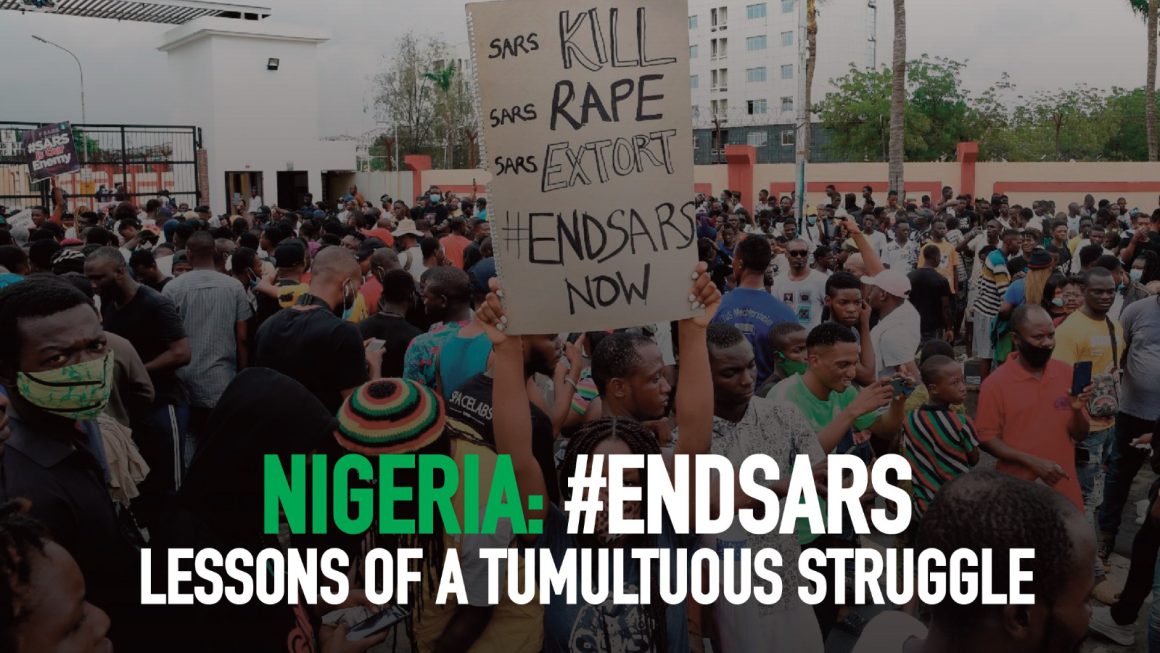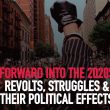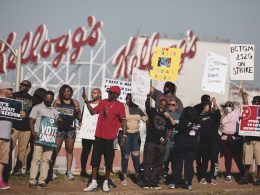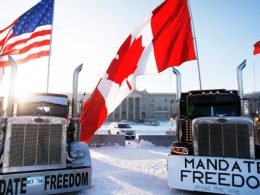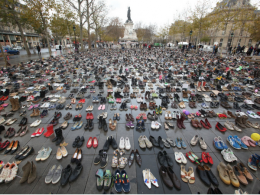The #EndSARS protest, a historic movement led by Nigeria’s young people, was drowned in blood by the government, because the elite feared issues of ‘bad governance’ were being raised. What are the key lessons to be drawn from a movement? Article by Aj. Dagga Tolar, Movement for a Socialist Alternative (MSA), our sister organisation in Nigeria.
The #EndSARS protests scared Nigeria’s ruling class. The country still grapples with the aftermath. From a state of shock over the killing and massacre at the Lekki Tollgate to the burning of police stations and the discovery of warehouses loaded with Covid-19 palliatives; the ruling class has been exposed for its lies, theft and lack of concern for our suffering.
The #EndSARS protest, a historic movement led by Nigeria’s young people, was drowned in blood by the government, because the elite feared issues of ‘bad governance’ were being raised, going further than those of police brutality which sparked off the protest.
But what led to this night-time killing of young people by the ruling elite? Why confront a peaceful protest against police brutality with the brutal killings of young men and women waving the national flag? What are the key lessons to be drawn from a movement led by the youth to end the police brutality visited on innocent citizens in the form of illegal arrest, extortion, prejudicial killings and rape?
Police brutality filmed
A recorded video of police officers, attached to the Special Anti-robbery Squad (SARS), brutalising a man to death and making away with his car, sparked off the protest. This event occurred in Ughelli, Delta state, in the South of Nigeria. #EndSARS began trending on Twitter and other social media platforms after the Ughelli event, as it has trended since 2017 when instances of police brutality generated anger online. Celebrities and other young elements called for mass protests across the country as they concluded that physical protests are required to force change from a stubborn government. Trending outrage on the social media was no longer enough.
72 hours after the Ughelli event, the rage and protest grew out of the social media platforms onto the streets. And like wildfire, on street after street, in community after community, state after state, Nigerian youth spread the protest across the country. Millions of youth took over the streets in a festive, peaceful protest movement with the slogan “#EndSARS” bringing the country to a standstill. Wherever they cropped up, protesters said “we are all leaders,” in a bid to prevent the emergence of leadership the government can buy off. Not even the celebrities that sparked off the protest could pass themselves across as leaders; the attempt of the singer, ‘Davido’, to conduct negotiations with the police chief was derided on Twitter as a bad joke.
A near general strike situation had arisen by Monday, October 19, until the movement was drowned in blood on the 14th day by a combined force of the military and the police leading to the massacre at the Lekki Tollgate in Lagos on October 20. The day of the shooting of protesters by the military under the cover of darkness is a day that will go down as “Black Tuesday” in the history of mass movements and struggles to transform Nigeria and improve the conditions of the working masses.
Black Tuesday
For about two hours non-stop, between 6:43 p.m. and 8:24 p.m, a Nigerian military contingent from the Bonny Camp Army Cantonment shot live ammunition at peaceful protesters, mauling down young men and women.
This occurred without any verbal engagement with the protesters. A police unit moved in after them applying the same measure of maximum violence, and by dawn, a clean-up operation had been carried out to ensure, in the words of the governor of Lagos, BabajideSanwo-Olu, that “not a scratch (spot) of blood” was to be found at the scene.
Many people who have lost loved ones are afraid to openly announce the disappearance of their loved ones. Hospitals around Lekki that treated the victims of the inglorious shooting were also threatened with withdrawal of their operating license by the state to keep mum about the true figure of deaths. But Amnesty International has put the number of dead at 12 people, which is considered modest according to reports from protesters. However, investigative reports from Premium Times and later CNN have revealed the true extent of human losses and how the Nigerian government is desperately shifting its stories as new evidence emerges.
Why drown a peaceful protest in blood? What was it about the protest, despite its peaceful nature, that constituted a greater threat in the primitive calculation of the ruling elite than the Boko Haram insurgency. Pure and simple, it was the fact that the movement had evolved from a protest against police brutality to a protest against the government and the ruling elite, with increasing calls from protesters for the resignation of the President.
Also, the businesses of the big men were suffering huge losses at the time. Two days before the Lekki massacre, the Lagos Chambers of Commerce and Industry (LCCI) had announced ruefully that the country (of course the big men) have lost N700 million to the protest. In November, more than a month after the Lekki massacre, the Inspector General of Police claimed that the protest was not peaceful because it began aiming for the removal of the President. There lies the answer: the ruling class denuded itself of democratic niceties immediately it felt a serious threat to its rule of pain and agony.
The ruling class and apologists for the Buhari regime in the media are making it to sound like a taboo that the people cannot remove an oppressive government when they so desire. Ironically, this defence is advanced by the same President who headed the junta that ended Nigeria’s second republic under Shehu Shagari in 1983. Buhari has only succeeded in proving socialists right that military or civil rule serves the interest of big business unless the working people lead other oppressed people to take over the banks, big businesses and economic infrastructures that are presently used to ruin the economy of the common man at the expense of creating billions for a few. However, in resolving to remove a President like Buhari, who was elected by a mandate from an election with the lowest turn-out in Nigeria’s history, the people will be asserting democracy over and above the limited democracy capitalism offers.
The Lekki massacre — who is responsible?
There is an ongoing attempt to rewrite the narrative and history of the #EndSARS protest, to put the blame of the violence and killings on the protest itself. This is a complete falsehood. The apologists of the ruling elite, in opposition to protest, a clear democratic right, have always stated that it would be hijacked. But the 14-days #EndSARS protest was peaceful, with the only instances of troubles being those caused by thugs sponsored by the state. In Abuja and Lagos, protesters apprehended some of these thugs, who confessed on record to their sponsorship by the state.
The killings of Jimoh Isaq in Ogbomosho, and Ikechukwu in Ojuelegba in Lagos, were carried out by the police, during the protest and with no reasonable cause or provocation by the protesting youth. In the same vein, protesters were also attacked in Abuja, Lagos, Jos and Osogbo, by state-sponsored hoodlums without any form of intervention from the police, who sometimes assisted the hoodlums with government-issued arms. The peaceful conduct and non-violent nature of the protest left no room to justify the violence applied against it by the state.
But who ordered the Military to shoot peaceful protesters at Lekki Tollgate? Lagos State governor had earlier maintained a narrative that it was powers beyond his control that ordered the infamous intervention of the military. However, he was the one that imposed a 4 pm curfew, which was unrealistic and poorly conceived in a city like Lagos that is afflicted with unending traffic logjams. It was the heavy backlash that followed the 4 pm curfew’s time that compelled the governor to re-announce 7 pm on national TV and radios as the commencement time.
The governor had denied knowing beforehand that the military was intervening at Lekki. He intended to wash his hands of the blood of those young men and women spilt at Lekki. Let it be known that the Governor was part and parcel of the calling out of the military because the imposition of curfew set the stage for it to move against the peaceful protesters at the tollgate, including the shooting that followed. It is therefore impossible for the governor to absolve himself of blame. Meanwhile, the testimonies of the military contingent before the investigative panel on SARS and Lekki shooting indicted the governor as the one who called on the military to intervene in the first place. General Taiwo, who gave the military’s testimony, even said the military was not happy with the governor for not owning up to his complicity in the Lekki killings.
The Lekki investigative panel has served the purpose of exposing the elaborate scheme about the black Tuesday, including the amateurish lies of the authorities. It cannot serve any more purpose than that; it cannot serve justice. For example, the governor who set it up is a participant in the crime and has not undertaken to wave his immunity as a governor. He has not even indicated his readiness to testify before the panel where he has been indicted. The panel also has no power to convict or sentence; it will more or less be a talk show to give people the wrong impression that justice is being served and that protests for justice should be put aside. The truth is far from this, for real justice can be gotten by the working masses with the demonstration of the power of their numbers. They must organize to demand from the ruling elites, insisting that the injustice and atrocious policies aimed at impoverishing the working masses be reversed.
For the governor to testify, it will take a protest of young people and parents who do not want the heroes who were murdered at Lekki to die for nothing. For police officers found guilty at the panel to be tried and sentenced, and police brutality brought to an end, it will require a government of the working masses to come to power, guided solely by the interest and well-being of the working masses as opposed to this current government that defends the interest of the few members of the ruling elite and the greed for profit-making by big business and members of the billionaire club.
The government is desperate to impose a false notion on the people that the act of protest is detrimental to public order, although the only order that protests threaten is this order of oppression, of corruption, of public theft, the order of the ruling elite.
It also hopes to employ the instruments of the judicial panel to create the pretence that justice can be better served by the panel when it was the protest itself that forced this turn of events on the government. It follows therefore that the democratic right to protest should at all times be defended, and protected and be backed by law, as opposed to using the instruments of coercion to annul this right, which was what government did. How it can now so absolve itself of blame, for the killings and drowning out the protest in blood awaits to be seen by all.
The authorities have made a desperate attempt to link the violence of October 21st, a day after the Lekki shooting, with the #EndSARS protest. The burning of police stations, including the distribution of hoarded Covid-19 palliatives by hungry people, is now being weaponised as a scarecrow to dissuade Nigerians from any future protest. Firstly, the violence that erupted in reaction to the unprovoked killings by the Army and Police cannot be separated from the murderous actions by the government forces. If anything, it was the anger at the killings at Lekki in an earlier attempt to forcefully end the protest that provoked the subsequent violence and attack on police stations.
The nation had woken up on the 21st October stunned by the fact that soldiers had forcefully dispersed peaceful protesters with guns and bullets. This was the anger that led working-class youths all over Lagos onto the streets the next day. But instead of demonstrating empathy with the loss and justified anger, the police felt emboldened to follow suit after the military had vacated the Lekki scene to unleash another reign of shooting and killing of protesters across Lagos. It was the violence of the Army and Police that instigated the violence of a section of the population that was furious at the carnage the state had supervised. While we condemn every form of anarchy, which affected even the few belongings of working people, one must condemn more loudly the government that primed a peaceful situation to anarchy because of its fear of losing power to the people that put it in power. Such is the hypocrisy of capitalist democracy; anything, including military intervention or fascism, can be relied on to keep the business of exploitation going.
The background
The immediate background to the #EndSARS protest is the problem of police brutality as indicated by the unending atrocities of police officers against innocent Nigerians.
The masses, and especially young people, became victims as the police employed its guns as instruments of extortion and intimidation of the mass of the working people.
A government serving a small rich elite in alliance with imperialism and Nigeria’s underdeveloped means of production has kept the country’s economy at the lowest level of the world economy as a producer of raw material and a net importer of manufactured goods; an underlining factor in Nigeria’s high unemployment, underemployment, inflation and poverty rates. This also is a consequence of a neoliberal capitalist system that leaves no room for the investment of the wealth made from Nigeria’s vast oil deposits to develop the means of production and provide for the needs of the working masses, as opposed to meeting the greed, theft and looting to fulfil the mad craze for wealth by members of the ruling elites, and by so doing making Nigeria the world capital of extreme poverty, with the working masses to be condemned to poverty wages, unemployment, illiteracy etc.
This is the reason for the poverty wages that leave the employed no other choice than to seek extra means of income. The rank and file of the police as wage earners are not excluded from this precarious existence. A police station provides a glimpse of the terrible working conditions that the government provides the same police it relies on to beat up protesting workers or youth. Most police barracks are not fit for lunatics elsewhere, in addition the government leaves the provision of uniforms and boots to the industriousness of each police officer. These precarious situations make police turn to their guns and uniforms as a means of earning an extra income; the corruption of the police force is on a higher level than that already existing among civil servants who suffer same neglect as every low paid worker for the Nigerian government.
This choice of illegal earnings is made worse by the fact that the ruling elite deny the police rank and file the right to belong to a union; the police are even denied the right to protest in the face of late payments of salaries and exploitation by the state.
But the logic of their illegal and criminal acts against the working masses and youth ignores the fact that these layers are even worse off. The common person in Nigeria is finding it difficult to get on with life, with the unemployment figure at 21.7 million (27.1%) of a labour force of 80.2 million, excluding the 28.2% that are not paid enough or underemployed. This is a figure that dwarfs the population of 35 countries on the African continent. Yet the youth (categorized as those between age 15 and 39) are worst hit by the unemployment scourge with a figure of 13.9 million. It is therefore not strange that they would be in the forefront of agitation since they constitute a bulk of those who suffer from Nigeria’s failed economy and especially the illegal activities of the police.
#ENDSARS and the fear of the leadership
Young people were wary of the bad example the leadership of Nigeria’s trade unions have set during previous protest actions. Just 8 days before the commencement of the #EndSARS protest, on September 28, the NLC and TUC leadership called off a much anticipated general strike just five hours before it was due to start. The betrayal of leadership in the trade unions is not enough to reject leadership generally. Leadership serves to provide foresight for a movement, educate protesters on the aims of the movement, and defend the ideas of that movement against falsification or blackmails. The prevailing idea that leaders are not needed denied the movement these advantages; the protest grounds were more carnival-like than centres of ideas; the government’s propaganda met no organised rebuttals.
In making a successful social revolution, a revolutionary programme, revolutionary leadership and the necessary tactics and strategies are important, with the knowledge and lessons of the history of the working class and the struggles of the oppressed strata of society against oppression.
Revolutionary leadership is supposed to be armed with the history of the working class and oppressed people of different lands to avoid their mistakes and not start history afresh. It is in this sense that the “leaderless” nature of the #EndSARS protest became counterproductive.
In the logic of the protest, it was valid to identify the failure of the leadership of Nigeria’s trade unions in previous protests and General Strikes, as a symbol of betrayal and their filthy relationship with the oppressors. The #EndSARS protest intended to prevent this by making everyone into leaders of the movement and by avoiding any semblance of organised leadership.
It failed to develop this further by having the hundreds of thousands of protesters democratically electing their representatives, even when basic organisational needs of the protest like sound systems, the provision of refreshments like food and water, cleaning of protest grounds after every protest was already being taken up. It neglected the most fundamental issue, the need for a daily review of the struggle, of its strengths and weaknesses, and on that basis drawing conclusions in terms of the slogans, programmes and the necessary line of action that must be taken as the struggle developed.
The right of recall remains the antidote to any failed leadership. This is an element that is not at play in the trade unions; it is a reason why situations should not be compared at face value; the #EndSARS protesters had no established bureaucracy like that in the trade unions.
The emergence of a coordinating council, that could have been elected street by street, and at every protest centre, city by city, and from where a national council could have emerged with an elected leadership, subject to immediate recall, would have gone a long way to provide better coordination of strategy and ideas for the momentous movement.
This is not to say that the #EndSARS protest was in reality leaderless. The leaders were the millions of working-class youths, who had trooped out into the streets, who independently mobilized themselves and worked out the slogans of the movement. And daily for 14 days, they saw to it that the protest grew from strength to strength. But in taking on a protest against police brutality, it touched on a very cardinal element of the nature of the capitalist state, which the corrupt ruling class of an oppressed country like Nigeria is sensitive to.
The ruling elite is organized, indeed they possess the financial resources, even the violent means that their society relies on to defend the interest of the big men. Confronting the ruling elite, working-class youth, and the working masses generally, cannot ignore the crucial aspect of the need for an organization and leadership to confront a highly organised class of a few, big men at war with the happiness of the majority of society. Such an organisation of the people must be democratic, and its leadership elected and subject to immediate recall if at any time it betrays or violates the programme of the movement.
This was missing in the #EndSARS protest. In Lagos, there was no coordination between the two major centres in Alausa and Lekki Tollgate. While working-class youth in Lagos had risen in revolt, other centres in the state remained isolated and independent of each other. Protest activities were limited to mounting barricades, which was soon transformed into musical concerts, and an outflow of pure anger at police brutality and oppressive governments.
With an organisation and leadership, the task of linking together the protests in the streets and city, including having a National Coordinating Centre would have been realised. This would have qualitatively transformed the movement.
The #EndSARS protest and the working class
The #EndSARS protest came less than two weeks after the aborted General Strike of Sept. 28, which was called off by labour leaders before the sun could rise. But in calling off the General strike, the working masses were extremely angered. That anger demonstrated the fact that the leadership of the trade unions cannot be trusted to provide the necessary leadership for the masses and their mass anger against the oppressive ruling elites.
Many people have erroneously concluded that the role of the working class in transforming society had now become useless; that they had to look elsewhere. The emergence of the youth and their heroic role in the #EndSARS protest has led a section of society to believe that the youth are the new messiah, who will lead the oppressed strata of society against the ruling elite and transform society for us all.
At no time must the error be made of equating the bureaucrats and leaders of the trade unions, who lead the traditional organizations of the working class, as the same as and one with the working class. The working class refers to the mighty force of human beings, who officially number over 80 million in Nigeria.
With their labour, they produce the goods and services that enable the wheels of society to function, without which society is grounded. Without them, not even Aliko Dangote, Africa’s richest man, can make his billions. Included in this mass as allies of the working class are the peasants and farmers, who earn their livelihood through their sweat and toil directly on the land, providing for us the food and meat and fish we eat. The huge population of traders automatically become another layer of oppressed strata who by their conditions of existence are allies of the working people.
For these various strata of oppressed people, it is the working class that stands out distinctly and progressively, both in its vision and function to provide leadership in the struggle against the billionaires and their cronies in politics, as represented by members of the billionaire club that props up the ruling elite.
Yes, while identifying the strength and energy of the youth as vital in the success of any struggle and commending them for initiating and leading the #EndSARS protest, the question must be posed as to who were these youth? Are they distinct, are they now a new class as we are now being made to believe?
The youths are not classless. #EndSARS protest was made up of mainly working-class youths, who daily toil to survive or aspiring members for the working class that have remained unemployed or underemployed. There were students grounded at home for months by the strike of university lecturers and refusal of the government to meet their legitimate demands.
Of course, we cannot ignore the role played by some layers of middle-class youth, who joined and supported from beginning to end the #EndSARS protest and provided logistic support for food and water in some of the major centres. This is not in any way strange. The middle class, while relatively not as badly off as the working masses, is still able to identify that their conditions are relatively incomparable to those of the upper classes of society. They are also gradually disappearing as a class, with the only distinction from the working masses being a bigger illusion in the fact that they are better off. They, therefore, can identify in moments of struggle that their fortunes and lot is tied to rendering support to the struggles of the working masses.
While it is correct to say that the protest had assumed a General Strike character by Monday of Oct. 19, with banks, most workplaces, schools and markets closed down, the working class either through their organisations and institutions chose to be completely silent. Not a statement of support from the NLC or even the TUC, when in reality a 48-hour General Strike would have in no little way provided additional strength for the movement enabling it to achieve its goal. The involvement of the working class in this sense both in terms of programme and ideas would have also ensured that its organizational strength and structure and finances would have helped to resolve some of the problems of the movement and would have guaranteed a better and more organized response to the violence employed to crush the protest by the state. This absence of a structure, which the working class could have brought to bear, was a minus for the #EndSARS protest.
But the failure of the labour bureaucrats to intervene in the movement increased their loss of face caused by their calling off the proposed General strike of Sept. 28. Even though the #EndSARS protest itself helped confirm the narratives of Socialists that the working masses were ready for a struggle against the ruling elite and that the strike, if it went ahead, would no doubt have forced the regime to completely back down from the hike in fuel prices and electricity tariff.
We must not join in this attempt to misrepresent the events that occurred or dismiss the role of the working class and the various currents manifested both in terms of idea and philosophy in the struggle for reforms and revolution. Yet Lenin was said: “Give me just one generation of youth, and I’ll transform the whole world”. We must acknowledge that the #EndSARS protest had given the country a new generation of youth, filled with determination to change the narrative of the storyline of deprivation, exploitation and misgovernance that has been the trademark of capitalism in this country.
The task before these youth in Lenin’s one word is to “learn”, yes, to learn Marxism. To learn Marxism is to know how society functions, to know the history of class struggles, the struggles of the working class and come to understand what class struggle means in the history of revolution, how revolutions have been made in the past and what class can accomplish them, including what ideas are needed for revolutions to be achieved. This is where the role of socialists becomes very important by identifying that Marxism is the banner, by attracting working class youth into the ranks of the MSA under that revolutionary banner, so that the necessary learning can take place. It is on these youth that the working class can in the future rely upon to lead the struggle to create a new leadership for the working class and its organizations. And ultimately as well build a political party of the working masses, with youth in the forefront, that will not seek to just win power for its own sake, but aims to accomplish a socialist revolution and end the rule of capital for all time.
A revolution is possible
The #EndSARS protest demonstrated that Nigerians can be united by their common suffering as indicated in this case of “police brutality,” as opposed to being divided by religion, ethnic origin or language. Marxists, and indeed all who want change, must celebrate this fact about the #EndSARS protest since it invalidated the narrative that a revolution is not possible in Nigeria.
It confirms the experience of the struggle of the working masses against the annulment of the June 12, 1993 election and the struggle to end military dictatorship. The same thing applies to the struggle and General Strikes against the deregulation and privatization of the oil industry.
This is what the ruling elite fear. The #EndSARS protest saw the growing consciousness of the mass of youth in leaps and bounds, from a mere quest to end police brutality, the protest grew to adopt the slogans “#EndBadGovernance” and “#EndJumbopay” of the elected public officials. These new slogans changed the movement from being a protest against the Buhari regime into one against the whole ruling elite, against the system that made police brutality a possibility. This new consciousness was revolutionary; in the thinking of the ruling elite the movement had been hijacked, when in reality it was the very logic of the mass movement that was at play. As Lenin pointed out: ‘There are decades where nothing happens and there are weeks when decades happen’. Thanks to the #EndSARS protest the working masses learned and grew their revolutionary instinct in ten days of struggle more than they had been able to learn in decades.





